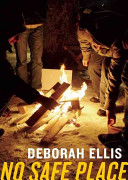
Orphaned and plagued with the grief of losing everyone he loves, 15-year-old Abdul has made a long, fraught journey from his war-torn home in Baghdad, only to end up in The Jungle — a squalid, makeshift migrant community in Calais. Desperate to escape, he takes a spot in a small, overloaded England-bound boat that’s full of other illegal migrants and a secret stash of heroin. A sudden skirmish leaves the boat stalled in the middle of the Channel, the pilot dead, and four young people remaining — Abdul; Rosalia, a Romani girl who has escaped from the white slave trade; Cheslav, gone AWOL from a Russian military school; and Jonah, the boat pilot’s ten-year-old nephew. As they attempt to complete the frantic and hazardous Channel crossing, their individual stories are revealed and their futures become increasingly uncertain.
- ISBN: 9780888999733
- Author: Ellis, Deborah
- Published: 2010 , Groundwood Books
- Themes: journeys, Refugees, Survival
- Descriptors: England (UK), Europe, Iraq, Realistic Fiction, Young Adult (ages 14-18)
- No. of pages: 224

The plot of this narrative is executed well through following the journey to freedom of three illegal immigrant children who are struggling to reach the shores of England and a British orphan joins them as he is released from the bounds of an oppressive uncle. The character development of the three male children: Abdul, from Baghdad, and Cheslav from Russia and Jonah from England and one female child: Rosalia a Romani, is well done. This story is initially set in France and culminates in England and provides a fine description of the traumatic lives many immigrants lead in France. It provides a rich cultural background of the countries and distinct circumstances that each character comes from.
The message of peace and its elusive nature is articulated well. The turmoil within other countries is related as a sharp contrast to the peace found in the streets of Cornwall. The issues of illegal immigration and some reasons for it are articulated well within the story. One ends up sympathizing with the lives that the characters have lead and agree with their wish to reach any place that can provide them with safety. The view of oppressors from different cultures provides a balance viewpoint.
The Muslim boy has a positive depiction as the main protagonist of the story. Abdul is presented as caring and sensitive even though he has so many forces against him. His life and the loss of his family and his close friend in his home country seem to be the reason for his struggle to reach Cornwall. Abdul loyalty and sincerity to take the token of his friend to England seems his way of taking action even though he does not seem to have planned out what he needs to do after that. Ellis does not overstate extremist views towards women and homosexuals.